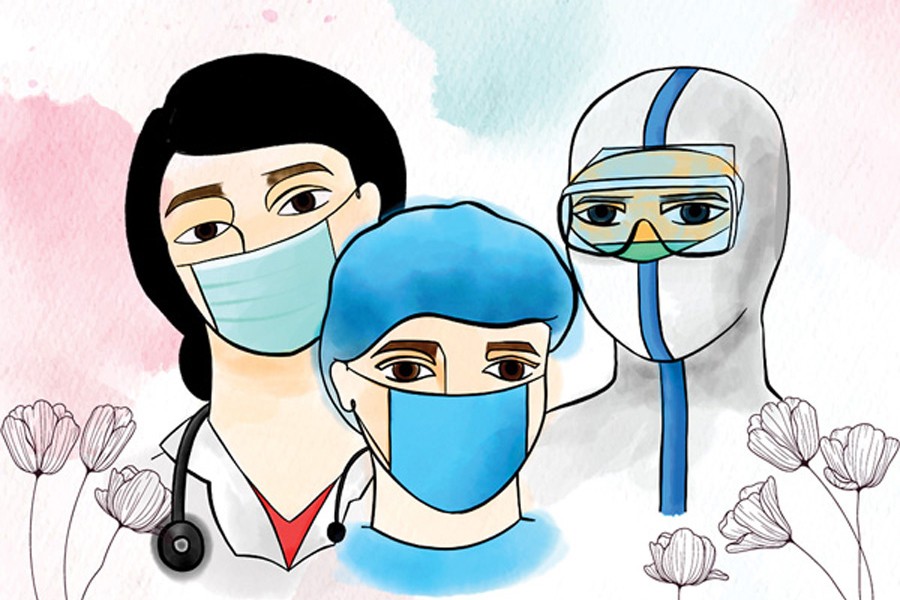
Published :
Updated :

Swatil Binte Mahmud was quite young when she observed that there was a lack of representation of working women like her mother Taslima Begum-- in the books that she read, in the movies that she watched. She says, "My mother was different; she was a working woman and I loved that. But I also knew that something was wrong in the way women like her were viewed and portrayed by our society. I grew up hearing from my friends' mothers, neighbour aunties, and other family members that my mother was a bad mother for having a job."
Fast forward to the year of the Covid-19 pandemic, Swatil realised that stories of women-- women like her mother, her sister, her female colleagues, and even herself needed to be heard. Media did not show women like them, movies failed to portray them, books lacked characters like them, and nobody talked positively about them. Thus, Swayong was launched on June 04, 2020 to reiterate the voice of those overlooked by all.
Swayong is an online platform that aims to dismantle social injustices through storytelling. Swatil and her sister, Kazi Mitul Mahmud, co-founder of Swayong wanted to create a safe, inclusive, and constructive space for conversation and growth. They wanted to create content that aims to encourage people to interact meaningfully with sensitive topics, breaking down inhibitions about 'shameful' issues of women. Swayong believes that telling stories is one of the most powerful means to influence, teach, and inspire. Storytelling forges connections among people, and between people and ideas. When it comes to values, communities, and institutions-- stories that people hold common are an integral part of the ties that bind them.
Swayong became the runner up at the Digital Khichuri Challenge Covid-19 Edition in the ideation level in August 2020. The Digital Khichuri Challenge (DKC) 2020 was conducted by the United Nations Development Program (UNDP) supported by ICT Division and Startup Bangladesh. The theme for Digital Khichuri Challenge (DKC) 2020 was to address the stigma and discrimination faced by Covid-19 patients and frontline healthcare workers. Swatil Binte Mahmud and Kazi Mitul Mahmud, the founders of Swayong-- knew from the beginning, whose stories they will be telling through their platform. "We decided to address the gender-based issues that female frontline warriors like healthcare workers, hospital staff, aid workers, and journalists have been facing during the dreadful pandemic. This was because female frontline workers during Covid-19 remain underrepresented and their stories remain unheard. Swayong wanted to be a safe and inclusive space to share their stories," added Swatil, the founder of the initiative.
The aim of Swayong's female frontline worker series was to choose a social injustice issue to address, highlight, and dismantle it through the platform. About 16 firsthand accounts and real-life stories were collected from the field. Among others, there were two relief workers, one development worker, three journalists, five nurses, one nursing superintendent and four doctors. They created engaging content for circulation on social media and produced 15 informative bite-size content pieces on female frontline worker issues. They also hosted a Facebook live session at the end of the series. Also, they conducted baseline and end line perception surveys to measure the impact of their initiative. All generated contents were published on their Facebook page in both Bangla and English to reach a wider audience.
One of the storytellers from this series, Madhuri Madhu, a nurse in profession has told Swayong, " At the beginning, whatever little supply of safety equipment from the hospital was available was not accessible to the nurses. Anyhow, the services of warrior nurses did not halt. We ourselves had to plan for our own safety and buy our own safety equipment. The only thought that ran in our mind was that no matter what, we must fight this disease in every possible way. There was no time to be scared, we had to fight with courage."
Another storyteller, Afsana Hossain Hini, a relief worker shared her part of struggle with Swayong, "I have been subject to a lot of physical and mental harassment while distributing relief among the needy. But I did not stop. I kept on going. I am a witness to many nasty incidents. No matter how much we say that women are free, in this society, all women are victims of harassment. One day I felt an uncomfortable touch in the middle of a crowd while distributing relief. One of the men from among the people we were helping at times of hardship-- tried to touch my female body even through PPE."
Swatil realised that there is a gap, a gap which gets bigger every time a woman decides not to talk about herself, when she is unsuccessful, when she tries to find stories about other women like her, and when she does not have a space to share her stories. She believes that women need to read, talk and learn about what the female frontliners are going through, how valiantly they are fighting the virus and how at the same time they are still taking care of their loved ones at home. This campaign of Swayong will work as an awareness raising and advocacy medium to break stigma around working women, women's issues and women's working environment. Also, highlighting real life issues faced by women of different professions in the field will help to improve the quality of their lives in the future.
The writer can be reached at samudragupta06@gmail.com


 For all latest news, follow The Financial Express Google News channel.
For all latest news, follow The Financial Express Google News channel.